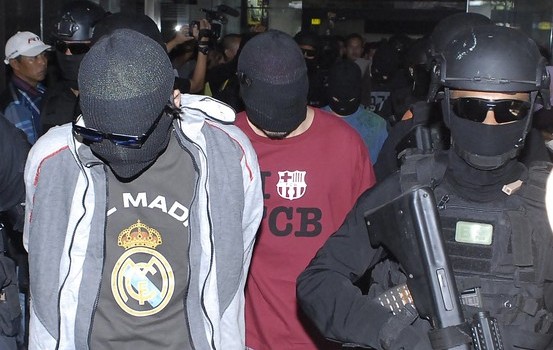Four Men Arrested Saturday on Sulawesi Island Were Traveling on False Turkish Passports, Police Say
JAKARTA, Indonesia – Police said Monday they were questioning four men arrested on the Indonesian island of Sulawesi believed to be ethnic Uighurs who were allegedly attempting to link up with one of the country’s most wanted Islamic militant leaders.
But two days after the arrests, they were still trying to sort out who the men were and find a linguist capable of properly questioning them. “They only speak Uighur,” said National Police spokesman Brig. Gen. Boy Rafli Amar.
The four were arrested Saturday carrying false Turkish passports, police said, and were initially thought to be Turks. Police said then that they would explore whether the men were connected to Islamic State. Gen. Amar said police have found no evidence linking them to the Middle East militant group.
Police said the men were from Turkestan, a term that covers a large area of central Asia including Xinjiang, the region many Uighurs consider their homeland. In recent decades, Xinjiang has grappled with a sporadic, violent rebellion by some Uighurs against Chinese rule.
Gen. Amar said police had not determined whether the men came from within China. They believed the four had traveled from Turkestan to Cambodia, then to Thailand, and then by air to Kuala Lumpur, Malaysia, and Indonesia.
It wasn’t clear yet whether the men had legal representation.
The allegedly false passports from Turkey, which borders Syria and is often used as a route by foreign fighters seeking to join the civil war there, have added to police confusion over the men’s identity.
“Those four arrested are from Turkestan but they came here with Turkish passports,” Gen. Amar said. “We have not found that the four are linked to the terror organization ISIS,” one of several acronyms for the Islamic State.
Gen. Amar said the men appeared to be traveling to meet with Santoso, who the police say is one of the country’s most wanted terrorists. He operates in the rugged Poso region of central Sulawesi, the area where they were arrested. Mr. Santoso has long had leadership roles in Indonesian Islamic militant groups. He is now a supporter of Islamic State, Gen. Amar said.
“Santoso is someone who is deeply into ISIS teachings and spreads information on ISIS intensively,” he said.
Sidney Jones, director of the Jakarta-based Institute for Policy Analysis of Conflict and a leading expert on terrorism in Indonesia, said the arrests will likely lead to greater action by the government to hunt down Mr. Santoso.
“I would expect a redoubled effort to find Santoso and more serious anti-ISIS measures being put in place,” she said.
In China, Foreign Ministry spokesman Hong Lei said his government needed to “gather more information” on the arrests.
The arrests come as the Indonesian government is increasingly concerned about the possibility of Islamic State supporters in Indonesia staging terrorist attacks. The country was a hotbed of major terror attacks by Islamist militants in the early 2000s before anti-terror policing improved.
On Sunday, President Susilo Bambang Yudhoyono called on government agencies, religious leaders and the public to help stop the spread of Islamic State influence.
Djoko Suyanto, the coordinating minister for political, legal and security affairs, said the president had instructed government agencies to prevent Indonesians from flying to the Middle East to join Islamic State, including by denying passports if that appeared to be their intent. Indonesia will ask foreign governments to be selective in providing visas to Indonesians, he said.
Mr. Suyanto said that the government is collecting names of Indonesians who have traveled to Syria and is monitoring their activities. Four Indonesians have died in Syria, he said, including two in suicide bombings.
Governments around the world are worried that their nationals who have gone to join the fighting in Syria and Iraq will someday return and mount terror attacks in their homelands, much as fighters returning from Afghanistan did more than a decade ago.
—Joko Hariyanto and Yogita Lal in Jakarta, and Grace Zhu in Beijing, contributed to this article.

Leave a Reply